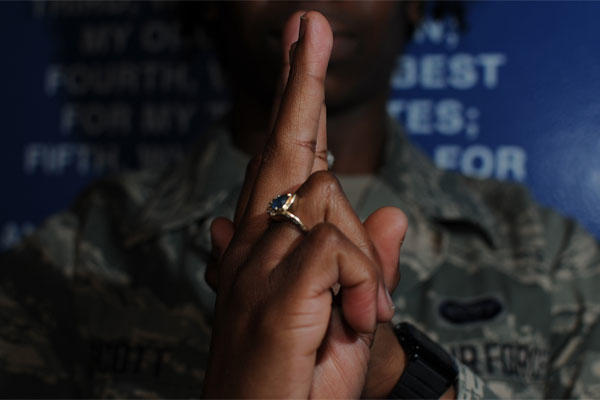MAXWELL AIR FORCE BASE, Ala.-- "I don't do what I do in pursuit of reciprocation. Instead, I do what I do in pursuit of the ongoing gratification that I feel each time I use my hands to provide a voice for those who may never actually hear one."
These words belong to Airman 1st Class Shaney Scott, an enterprise service desk technician for the 690th Network Support Squadron here, at Gunter Annex. She has been providing a voice for people using only her hands since the age of 7. Scott was taught American Sign Language, or ASL, by her mother as a means to communicate with her deaf foster brother.
"During my youthful years, my mother taught me, extensively, the value of communication and understanding," Scott said. "There's a different realm you enter when using sign language. It's as if the connection between you and the people that you're signing with develop a deeper connection than what you may experience during verbal communication.
"You have to remember, that some of these people will never hear a voice, never hear a song, or experience a graceful hello," she said.
Although Scott's foster brother is now a college student, the distance has not stopped their communication. She said the distance has given her the necessary motivation to talk to more people using sign language, getting to know their stories on the way.
"I utilize my skills when I do volunteer work at the local schools in Montgomery and during base events," she said.
Since being stationed at Gunter, Scott has participated as a sign language interpreter for 15 events, on and off base.
Scott's most recent event was the Dr. Seuss celebration hosted by a local base library. She interpreted Seuss's book "The Lorax" as it was read out loud to the children by Lt. Col. Jennifer Suarez, the commander of 42nd Force Support Squadron.
"I am also an interpreter at my church," Scott said. "I assist the choir when they sing to the congregation by signing the words so those who are deaf can follow my signs to know what songs are being sung.
"Additionally, I sign when the preacher gives his sermon, for the same reason. Typically, when I sign in church, even those who are not deaf will follow my hand movements, teaching themselves to sign in the process."
Scott also teaches sign language to those who pick up an interest in the subject after watching her converse using the skill.
"It makes me feel amazing to be able to communicate with those who know sign language; however, I feel a different type of amazement when teaching people to sign who are not deaf," she said. "Their interest in the language acts as motivation for me."
Despite being fluent in America Sign Language, Scott admits that she is still learning new words and sentences daily, and that learning ASL has its difficulties.
"There are many difficulties a person may experience when they begin to learn sign language," Scott said. "For me, the difficulty is finger spelling. I sometimes try to finger spell fast, especially when I have a lot to say. I often confuse myself with trying to finger spell complex letters."
Scott also finds it difficult perfecting her palm orientation.
"Learning proper spacing, palm orientation and location can be tough," Scott said. "When you're signing, your hands have to be precise in everything that you do. The location and orientation of your palm can change the meaning of what you are trying to say. It's difficult, but like learning anything new, time, patience and application are what's key to mastery."
Aside from its difficulties, Scott said that once a person learns the language, they become a part of the deaf culture, a culture that is "just as exciting as any culture, except vocal chords are of no use in it, only expressions, smiles, body language and, of course, hands."
Though she sees herself as a proud member of the deaf culture, she said there are situations when the culture is not taken as seriously as it should be.
"There have been times when people have felt like sign language is not a real language and that deaf culture does not exist because it is not as prominent as other cultures, and that is wrong," she said. "In my opinion, where there is language, there is culture.
"Every culture has its own meanings and interpretations of words and gestures; the deaf culture is no different," she said. "Those who become a part of this culture, either by birth or free-will, know they are a part of the culture when the serving of others ... comes before serving themselves -- a state of mind that is similar to Air Force culture."
As an Airman, Scott said she has big dreams for her future in the service. She wants to continue to serve her country for as long as possible,while simultaneously expanding her benefits to the deaf community.
"I would love to someday get a special duty assignment at the Pentagon," Scott said.
According to Scott, there is a large deaf population in the District of Columbia area.
"To be surrounded by people who sign while also serving my country with exemplary honor, dignity, pride and respect that the Air Force has instilled in me is a dream that is bound to come true," Scott said.





























